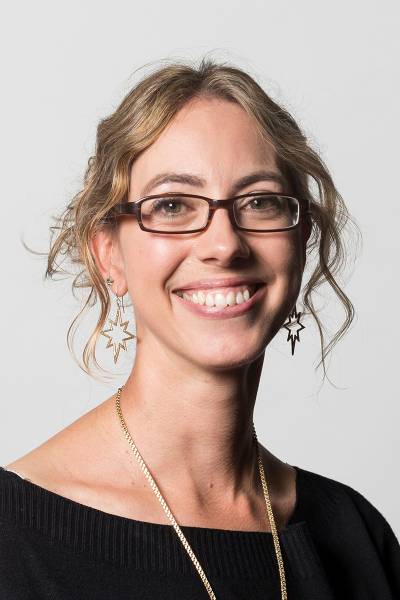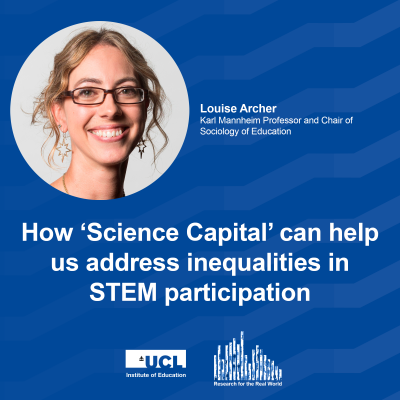Louise is the Karl Mannheim Chair of Sociology of Education at IOE and is currently the Principal Investigator of a number of large national projects.
What is your role and what does it involve?
Currently the largest part of my role involves directing three large national research projects, which I am incredibly grateful and fortunate to have superb teams working on. These are:
- the 13-year longitudinal ASPIRES study,
- Primary Science Capital Teaching Approach,
- Making Spaces, and
- Youth Equity & STEM.
Teamwork is really important to me; I think we all work better through collaboration. I am also co-chairing the Centre for Sociology of Education and Equity.
How long have you been at UCL and what was your previous role?
I joined IOE in March 2017. Previously I was a Professor of Sociology of Education at King's College London for over 11 years, where I was Director of the Centre for Research in Education in Science, Technology, Engineering and Mathematics (CRESTEM).
What's the most important thing you've learned from your students about the subject you teach?
Students will always show you a new, different and interesting angle on anything - however many times you have taught that topic in the past.
I enjoy learning from students and find their contributions both refreshing and productive, especially when they are bringing their own identities and experiences to bear on the subject matter.
What working achievement or initiative are you most proud of?
I am really proud (and often amazed) at the impact that our work on the concept of 'science capital' and our tools like the Equity Compass have achieved.
“It is a real privilege to see schools and informal settings, like science centres and museums, finding our work useful, taking up the ideas and adopting more equitable practice as a result. As a researcher committed to social justice and 'making a difference', it is really rewarding!"
Tell us about a project you are working on now which is top of your to-do list.
I am really excited about the findings that are coming out of our ASPIRES project currently. ASPIRES is a thirteen year longitudinal study and the cohort of young people that we have been tracking since age 10 are now in their early twenties.
It is fascinating seeing how their education and employment trajectories are developing and trying to unpick the different influences on these. They are a wonderful group of young people and it is a real privilege being able to follow their lives.
What would surprise people to know about you?
I used to be part of a feminist academic performance group (called ‘FAAB’). Over the course of a few years we performed our satirical set at various conferences in the UK and even the USA. We had passion and a strong political commitment – which hopefully helped hide the fact that we were a little less strong on points like tuning and timing...
What other piece of research outside of your own subject area interests you?
As a sociology of education researcher who has been looking at inequalities through the case of science education, I have become increasingly fascinated by physics. This would have surprised my dad and anyone who knew me at school, as it used to be my undisputed least favourite subject. Now I am an armchair enthusiast of things to do with space and cosmology. I admire the sheer awesomeness of physicists' attempts to understand the universe, right down to the quantum level. It's quite mind-blowing!
 Close
Close



